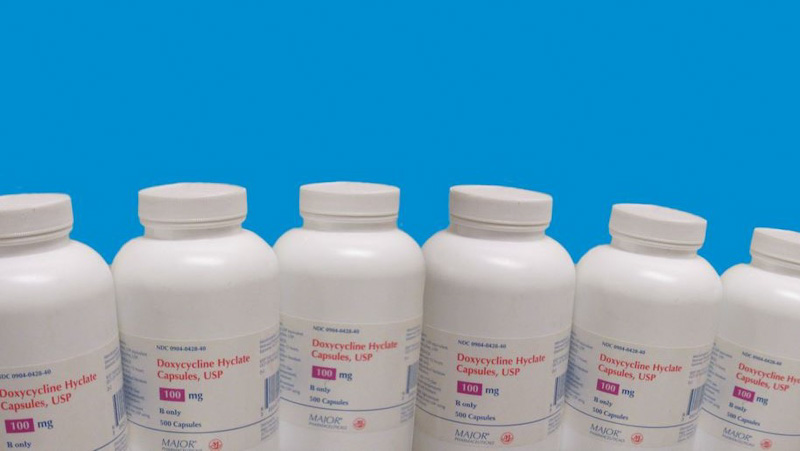Key points
- Doxycycline is the recommended treatment for most patients with Q fever.
- A longer treatment duration is recommended for patients with chronic Q fever.

Treatment options
Doxycycline is the recommended first-line treatment for most adults with Q fever. It most effectively prevents severe complications if it is started within the first 3 days of symptoms. Treatment should be started based on clinical suspicion and should be started as soon as the disease is suspected, even if laboratory results are not yet available. If the patient is treated within the first 3 days of the disease, fever generally subsides within the first 72 hours of antibiotic therapy. Fever may persist for longer in severely ill patients.
Treatment is generally not recommended for patients who are asymptomatic or who have already recovered from their illness, but might be considered for those at high risk of developing chronic Q fever. There is no role for prophylactic antimicrobial agents in preventing Q fever after a known, naturally occurring exposure prior to symptom onset; in these cases, prophylaxis may extend the incubation period by several days but does not prevent symptomatic illness.
- Adults: Doxycycline, 100 mg every 12 hours for 14 days.
- Pregnant women: trimethoprim/sulfamethoxazole, 160 mg/800 mg given every 12 hours throughout pregnancy, but not beyond 32 weeks gestation. For pregnant patients beyond 32 weeks of gestation, consult with a specialist in infectious disease.
- Children 8 years or older: doxycycline, 2.2 mg/kg body weight (up to 100mg) every 12 hours for 14 days.
- Children under 8 years with high-risk criteria (i.e., those that are hospitalized, have severe illness, have preexisting heart valvulopathy or congenital cardiac disease, are immunocompromised, or in whom treatment for Q fever has been delayed by >2 weeks from illness onset: doxycycline, 2.2 mg/kg body weight (up to 100 mg) every 12 hours for 14 days.
- Children under 8 years with mild or uncomplicated illness: doxycycline, 2.2 mg/kg body weight (up to 100 mg) every 12 hours for 5 days. If patient remains febrile past 5 days of treatment, treat with trimethoprim/sulfamethoxazole 4-20 mg/kg/24 hours (dose based on trimethoprim component) in equally divided doses every 12 hours (maximum: 320 mg trimethoprim per 24 hours).
The duration of treatment for patients with chronic Q fever is based on serologic response and evidence of clinical improvement. Serologic monitoring of a patient with chronic Q fever should be done in consultation with an infectious disease specialist. The information provided below represent general guidelines for specific clinical manifestations of chronic Q fever; treatment regimen and duration must take serologic response and clinical improvement into account.
- Adults with endocarditis or vascular infection: doxycycline, 100 mg every 12 hours and hydroxychloroquine, 200 mg every 8 hours, for at least 18 months.
- Adults with non-cardiac organ disease: doxycycline, 100 mg every 12 hours and hydroxychloroquine, 200 mg every 8 hours.
- Postpartum people with elevated titers >12 months after delivery: doxycycline, 100 mg every 12 hours and hydroxychloroquine, 200 mg every 8 hours for 12 months.
- Pregnant women: no current recommendations. Consultation with an infectious disease and obstetric specialist is encouraged.
- Children: no current recommendations. Consultation with a pediatric infectious disease specialist is encouraged.
Short course therapy, defined as less than 5 days, with doxycycline does not cause staining of permanent teeth, and most experts consider the benefit of doxycycline in treating Q fever greater than the potential risk of dental staining. Children with mild illness who are less than 8 years of age may be treated with a shorter dose (5 days) of doxycycline to minimize their exposure to the medication. Children with preexisting cardiac valve disease, or who are immunocompromised, or have delayed Q fever diagnosis and have experienced illness for 2 weeks without resolution of symptoms are considered to be at high risk for developing severe disease and should be treated with doxycycline for 2 weeks.
People with life-threatening allergies to doxycycline may need to consider alternate antibiotics such as moxifloxacin, clarithromycin, trimethoprim/sulfamethoxazole and rifampin. These treatment decisions should be made in consultation with a specialist in infectious diseases.
